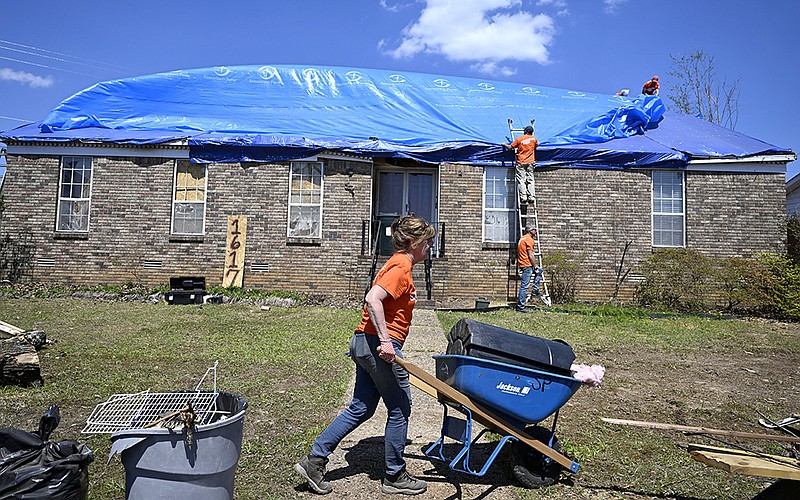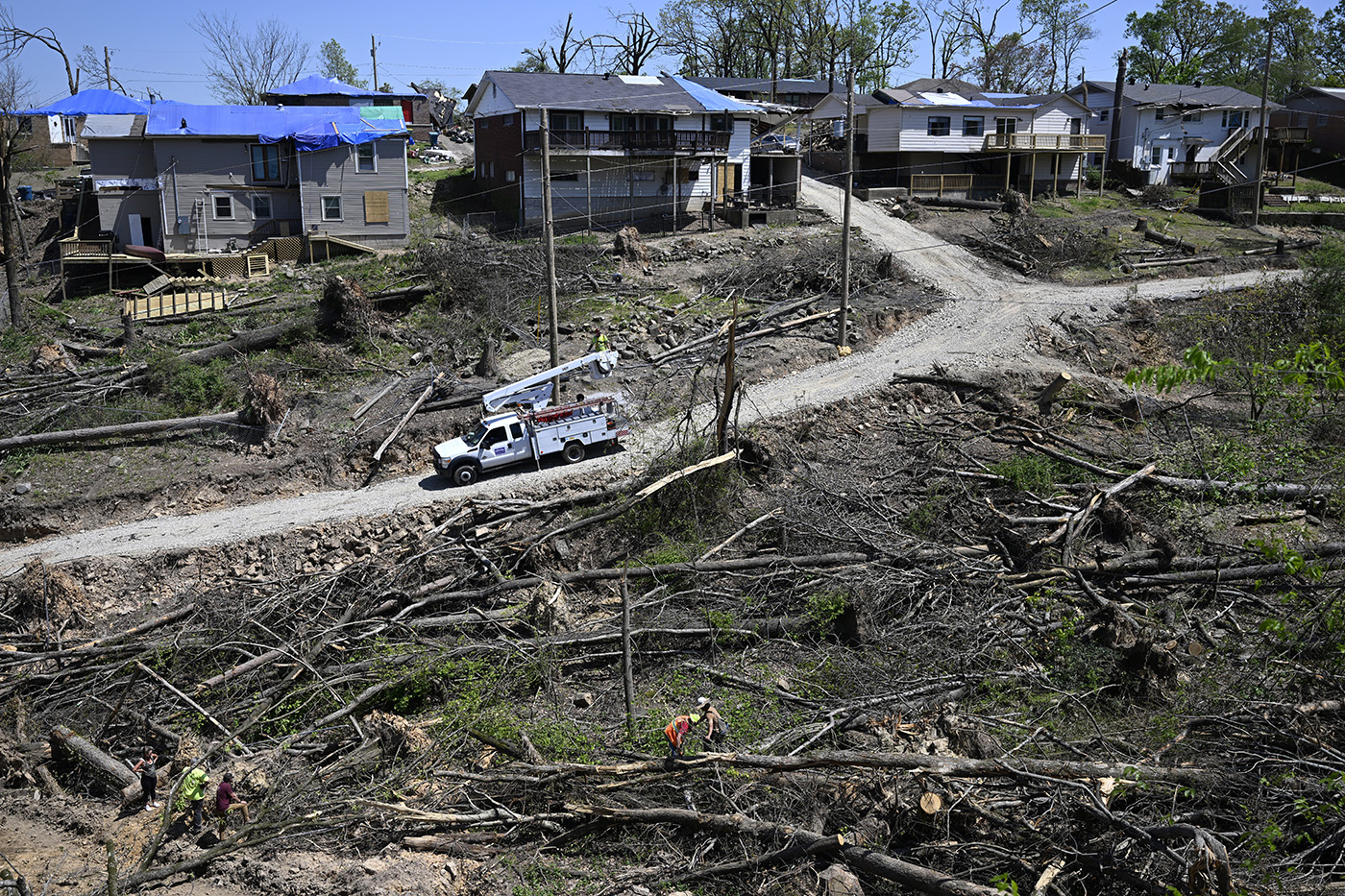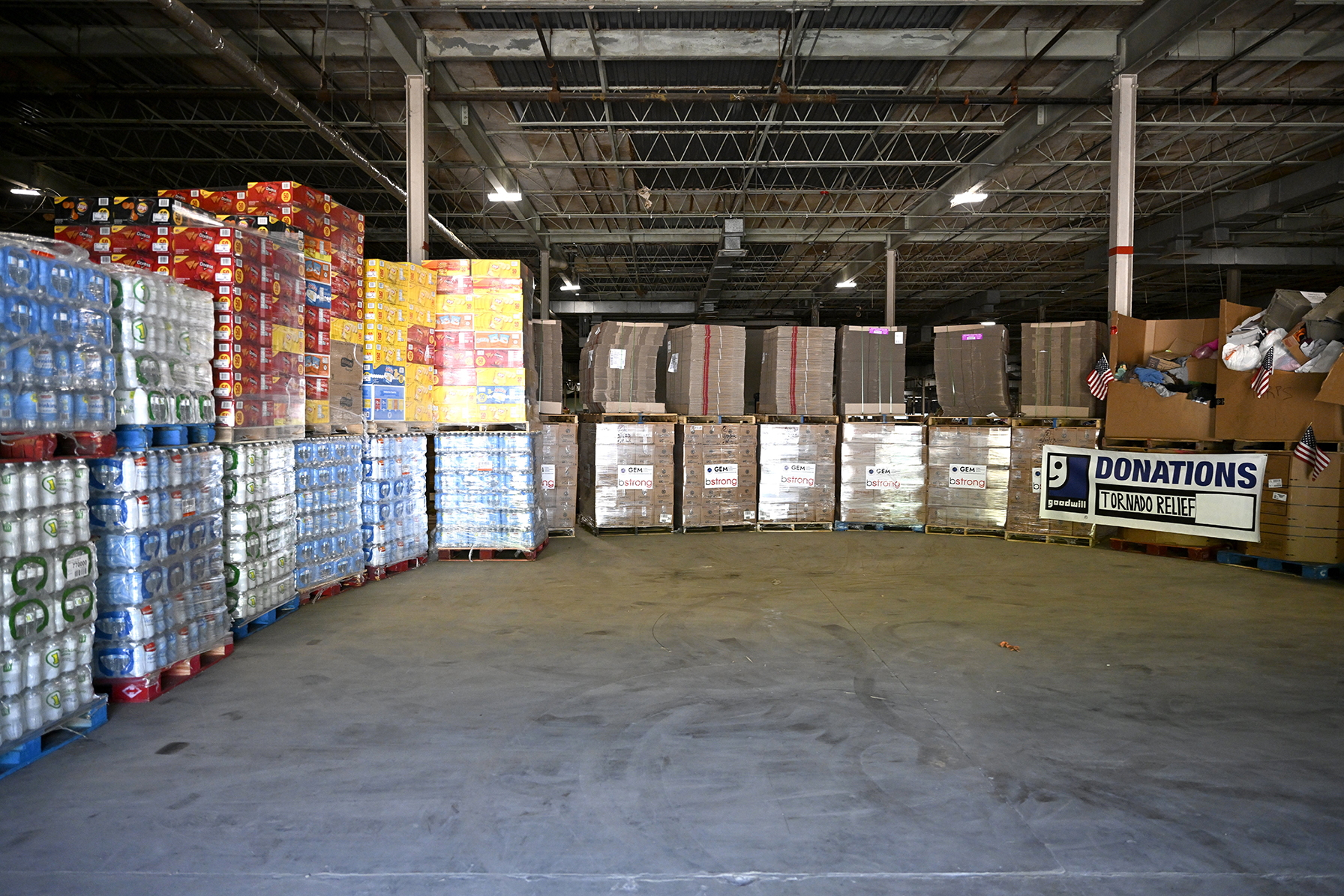For the past two weeks, churches, nonprofits and other aid groups in Arkansas have adapted on the fly to meet the changing needs of hundreds of residents whose lives were upended by tornadoes.
Now that survivors' immediate necessities have largely been met and the outpouring of donations and volunteers has started to subside, though, these leaders say their organizations must continue to adapt as Arkansans begin the lengthy, often exhausting process of rebuilding in the wake of a major disaster.
For some of the people who were affected by the two EF3 tornadoes that swept through Pulaski and Cross counties on March 31, such efforts could take months or years. Some local groups who are providing aid, however, say they are committed to ensuring survivors continue to get support throughout the process, however long it takes.
First Baptist Church in Jacksonville was among dozens of religious organizations, nonprofits and government agencies that quickly moved to offer aid to people affected by the tornadoes.
Seth Tucker, senior pastor at First Baptist, was out of town when the tornado reached Jacksonville. One of the church's deacons called him to ask if their building could be opened up as a shelter.
"The next morning, there's stuff being just left at the church," he said.
First Baptist quickly became not only a shelter, but a source for hot meals and needed supplies. Donations began pouring in, along with other offers of help.
Within a week, Tucker estimated the church had received at least $75,000 in donations of material goods, with an additional $10,000 in monetary donations. The donations, which ranged from clothing to bedding to hygiene supplies, quickly piled up on tables and along walls. In one room, clothes had even been draped across a piano.
"The truth is, we didn't plan any of this," he said.
Once the church started to fill up with donations, Tucker said members began writing posts on Facebook that emphasized what continued to be essential, rather than what was no longer needed. By Monday, the number of donations exceeded affected residents' demands. Church leaders stopped requesting donations on social media, and First Baptist has stopped accepting clothing. Tucker said the church plans to donate excess clothes to organizations that are better able to give them away, such as the Care Channel, also in Jacksonville.
First Baptist will continue to store and distribute nonperishable food, diapers, hygiene products and other goods likely to remain necessary in the weeks after the tornado, according to the pastor.
In Little Rock, similar aid was offered at the Immanuel Baptist Church City Center. Two days after the tornado struck, the site became a family assistance center in partnership with the city and other community organizations, providing food, water and other needed supplies.
Officials and representatives were also at the site to address survivors' immediate financial and legal concerns. City officials provided identification for residents who lost theirs to the storm, while the state Division of Workforce Services had set up a trailer in the parking lot with officials supporting survivors with storm-related employment needs. Entergy Arkansas provided power-related assistance, and Federal Emergency Management Agency officials helped with insurance and Small Business Administration loans.
By Monday, the City Center had served as many as 5,000 families, said Matt Hubbard, Immanuel Baptist Church's missions pastor and overseer of the site.
The center already had an operating food pantry, clothes closet and dental clinic, so its staff already knew how to provide a number of services that are useful in disasters, and how to quickly scale such efforts.
"We go from one to one thousand real quick," Hubbard said.
Though donations were still coming in, the center had started to slow down its collection, according to the pastor.
Like Tucker, the center's overseer acknowledged that clothing donations are often hard to deal with.
"A comment we often give to donors is, 'Would you give this to your son or daughter to wear?'" Hubbard said. "We don't want to become a dumpster."
The City Center has connected with other aid groups or local businesses to redirect excess items to places where they have a better chance of being used. Hubbard said that approach "still appreciates the donor" without interfering with the center's more critical operations.
While the site continues to give away a lot of clothes, diapers and food, they shifted their donation collection to focus on what people who came to the center for aid said was most useful, such as baby formula and batteries.
"We had to put ourselves in a position to say 'no' to what might be good but isn't best," Hubbard said.
Even as some of the volunteers helping with supplies had been taking on similar efforts for 30 years, the City Center has had to learn about some of the residents' most critical needs "on the fly," Hubbard said.
For instance, batteries were important for the thousands of people whose homes remained without power for days. Battery charging packs quickly became another critical item as they can significantly extend a battery's use.
"We've adapted and responded as we've heard from people coming through the line," Hubbard said.
Goodwill Industries of Arkansas President Brian Marsh explained that one of the reasons clothing donations can quickly build up is that people who have lost their houses don't immediately need much clothing because they have nowhere to put it.
In addition to providing vouchers for those affected by the tornadoes, Goodwill has given transportation and storage support to the city of Little Rock and entities such as Walmart and Amazon that don't have the space to hold large volumes of donated resources. The nonprofit has also been in contact with the American Red Cross of Arkansas and tornado-affected communities across the state, and has been sending its staff to process donations at centers that don't have enough volunteers.
While many aid groups accepted donations of material goods in the aftermath of the March 31 tornadoes, the Red Cross has been requesting that people give money.
"The main thing we try to get is financial donations," organization spokesman Joe Zydlo said. "That's what really helps in situations like this."
That money goes to providing financial assistance to families, setting up shelters and providing other comfort and care, added Josh Egbert, another Red Cross spokesman who was in Little Rock on Monday.
"If someone gives us $100, we can get 20 blankets for someone," he said. "We can buy coffee, we can buy cots, we can buy these things that these people need and provide them with financial stability to start their recovery process."
Heart of Arkansas United Way has also encouraged financial donations.
"Donations of money are more helpful because they allow organizations that are on the ground to respond to the needs that they see on a daily basis," said Mollie Palmer, vice president of communication and engagement at the organization.
Palmer said she has seen groups and companies partnered with United Way grapple with excess donations. Kimberly-Clark told them they had donations of wipes and feminine hygiene products.
"Our first response to that, knowing the problem," she said, "is finding out if this is useful."
Palmer said she thinks people want to do something generous in response to disasters, and they sometimes donate things "that aren't necessarily needed just yet." Furniture, for instance, is of limited immediate use to people whose homes have just been destroyed, according to the vice president.
She encouraged people who want to make a material gift to "just ask what it is they might specifically need at the time."
SHIFT TO LONG-TERM SUPPORT
The City Center in Little Rock is in transition, re-assessing current needs and working to determine what will be needed in the months to come, Hubbard said. While the center will scale back some of its short-term efforts, such as collecting donations of lower priority items, they will also deploy to hard-hit areas to assess what longstanding assistance survivors will likely require.
Hubbard said the center will have a better understanding of what those long-term needs will be once its teams connect with affected residents "on an individual level."
In Jacksonville, First Baptist is moving from "disaster emergency" status into "recovery" mode.
Tucker, the church's pastor, said they had seen a drop off in shelter residences, and that they were working to find permanent opportunities for those who remained without homes. In addition, many of the people who lost material goods have been able to acquire most of their needed food and clothing. Federal Emergency Management Agency representatives also remained in Jacksonville, according to Tucker.
"It's organized," he said. "And we're trying to make it something more sustainable."
The church has used donated money to get electricians to homes that were no longer connected to power, and to pay deposits for apartments for a couple of families, "and we're going to keep doing that," Tucker said.
"That's the kind of thing that I think will last for months and months and months," he said. According to the pastor, these longstanding needs will become the church's emphasis.
"This isn't a two-week mission trip," he said.
Tucker described a friend who lost his home during Hurricane Harvey, which caused devastating flooding in Texas and Louisiana in 2017. The pastor said he asked his friend what he had needed after the storm, and that the man replied, "Everybody helps early, but when it was month four and I was sitting on a slab where my home used to be, no one was with me. And I needed someone there."
The pastor said he wanted his church, and Christians in general, to be there for their cities when no one else is.
That initial influx of donations and volunteers in the wake of a disaster, followed by a dip in both as time passes, is common, according to Marsh.
"Everybody wants to be first to help," he said, but added that, in the days and weeks after the disaster, people often "get on with their lives."
Because survivors' needs change over time, Goodwill began issuing vouchers that affected Arkansans can use to replace belongings lost in the storms when they are in ready to do so. The vouchers, which do not expire, can be redeemed for goods in any Goodwill retail store in the state.
"Most people who have been displaced by the tornadoes are in immediate need of food, water and shelter," Marsh said in a release issued Monday. "It may be several days to weeks before they are in need of clothing and other household items. But when they are ready, these vouchers can be used anytime, at any location, for any item."
Donations collected by the nonprofit are offsetting the vouchers, ensuring there's an ample supply of both vouchers and product, according to the president.
Marsh said his nonprofit has been using vouchers in response to disasters in Arkansas since 2014, when a tornado that cut through Faulkner, Pulaski and White counties destroyed over 3,000 homes and killed 16 people.
The Red Cross of Arkansas also emphasized its continued dedication to residents affected by the tornadoes.
"[Donations] slowly start to drop off, but we want to remind people that we're going to be here for a while," Egbert said. "We're not going to just pack up and leave."
This week, the Red Cross opened recovery centers for survivors, according to a news release from the organization. The centers are located at Calvary Baptist Church in Little Rock; the Bill Harmon Recreation Center in Sherwood; the Jacksonville Community Center and the Assembly of God Church in Wynne.
Tornado response donations made to Heart of Arkansas United Way will go to the state's long-term recovery efforts, Palmer said. The money will continue to provide support after insurance companies and FEMA are done with their work, according to Palmer.



